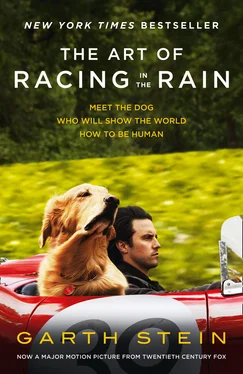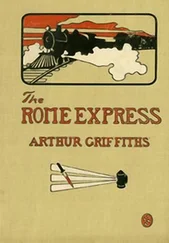“Could I have a minute alone—?” Eve started.
“Of course,” one of the ladies said, moving to the door.
“Come with us, puppy,” the other lady said to me on her way out.
“No—” Eve stopped them. “He can stay.”
I could stay? Despite myself, I felt proud to be included in Eve’s inner circle. The two ladies bustled off to take care of whatever they needed to take care of, and I watched in fascination as Eve suckled her new babe. After a few minutes, my attention drifted from the baby’s first meal to Eve’s face, and I saw that she was crying and I wondered why.
She let her free hand dangle to the bedside, her fingers near my muzzle. I hesitated. I didn’t want to presume she was beckoning me. But then her fingers wiggled and her eyes caught mine, and I knew she was calling me. I bumped her hand with my nose. She lifted her fingers to the crown of my head and scratched, still crying, her baby still nursing.
“I know I told him to go,” she said to me. “I know that I insisted he go, I know.” Tears ran down her cheeks. “But I so wish he were here!”
I had no idea what to do, but I knew not to move. She needed me there.
“Will you promise to always protect her?” she asked.
She wasn’t asking me. She was asking Denny, and I was merely Denny’s surrogate. Still, I felt the obligation. I understood that, as a dog, I could never be as interactive with humanity as I truly desired. Yet, I realized at that moment, I could be something else. I could provide something of need to the people around me. I could comfort Eve when Denny was away. I could protect Eve’s baby. And while I would always crave more, in a sense, I had found a place to begin.
The next day, Denny came home from Daytona, Florida, unhappy. His mood immediately changed when he held his little girl, whom they named Zoë, not after me, but after Eve’s grandmother.
“Do you see my little angel, Enz?” he asked me.
Did I see her? I practically birthed her!
Denny skated carefully through the kitchen after he returned, sensing that the ice was very thin. Eve’s parents, Maxwell and Trish, had been in the house since Zoë was born, taking care of their daughter and their new baby granddaughter. I began calling them the Twins because they looked very much alike with the same shade of artificially colored hair, and because they always wore matching outfits: khaki pants or polyester slacks partnered with sweaters or polo shirts. When one of them wore sunglasses, the other did, too. The same with Bermuda shorts and tall socks pulled up to their knees. And because they both smelled of chemicals: plastics and petroleum-based hair products.
From the moment they arrived, the Twins had been admonishing Eve for having her baby at home. They told her she was endangering her baby’s welfare and that in these modern times, it was irresponsible to give birth anywhere but in the most prestigious of all hospitals with the most expensive of all doctors. Eve tried to explain to them that statistics showed exactly the opposite was true for a healthy mother, and that any signs of distress would have been recognized early by her experienced team of licensed midwives, but they refused to yield. Fortunately for Eve, Denny’s arrival home meant the Twins could turn their attention away from her shortcomings and focus on his.
“That’s a lot of bad luck,” Maxwell said to Denny as they stood in the kitchen. Maxwell was gloating; I could hear it in his voice.
“Do you get any of your money back?” Trish asked.
Denny was distraught, and I wasn’t sure why until Mike came over later that night and he and Denny opened their beers together. It turned out that Denny was going to take the third stint in the car. The car had been running well, everything going great. They were second in class and Denny would easily assume the lead as the sunlight faded and the night driving began. Until the driver who had the second stint stuffed the car into the wall on turn 6.
He stuffed it when a Daytona Prototype—a much faster car—was overtaking. First rule of racing: Never move aside to let someone pass; make him pass you . But the driver on Denny’s team moved over, and he hit the marbles, which is what they call the bits of rubber that shed off the tires and that accumulate on the track next to the established racing line. He hit the marbles and the rear end snapped around; he plowed into the wall at pretty close to top speed, and the car shattered into a million little pieces.
The driver was unhurt, but the race was over for the team. And Denny, who had spent a year working for his moment to shine, found himself standing in the infield wearing the fancy race suit they had given him for the race with the sponsor patches all over it and his own special helmet that he had fitted with all sorts of radio gear and vent adaptors and the special carbon fiber HANS device for protection, watching the opportunity of his lifetime get dragged off the track by the wrecker, strapped onto a flatbed, and driven off to salvage without his having sat in it for a single racing lap.
“And you don’t get any of your money back,” Mike said.
“I don’t care about any of that,” Denny said. “I should have been here.”
“She came early. You can’t know what’s going to happen before it happens.”
“Yes, I can,” Denny said. “If I’m any good, I can.”
“Anyway,” Mike said, lifting his beer bottle, “to Zoë.”
“To Zoë,” Denny echoed.
To Zoë , I said to myself. Whom I will always protect .
7
When it was just Denny and me, he used to make up to ten thousand dollars a month in his spare time by calling people on the telephone, like the commercial said. But after Eve became pregnant, Denny took his job behind the counter at the fancy auto shop that serviced only expensive German cars. Denny liked his real job, but it ate up all of his free time, and he and I didn’t get to spend our days together anymore.
Sometimes on weekends, Denny taught at a high-performance driver’s education program run by one of the many car clubs in the area—BMW, Porsche, Alfa Romeo—and he often took me to the track with him, which I enjoyed very much. He didn’t really like teaching at these events because he didn’t get to drive; he just had to sit in the passenger seat and tell other people how to drive. And it hardly paid for the gas it cost him to get down to the track, he said. He fantasized about moving somewhere—to Sonoma or Phoenix or Connecticut or Las Vegas, or even Europe—and catching on with one of the big schools so he could drive more, but Eve said she didn’t think she could ever leave Seattle.
Eve worked for some big retail clothing company because it provided us with money and health insurance, and also because she could buy clothes for the family at the employee discount. She went back to work a few months after Zoë was born, even though she really wanted to stay home with her baby. Denny offered to give up his own job to care for Zoë, but Eve said that wasn’t practical; instead, she dropped Zoë off at the day-care center every morning and picked her up every night on her way home from work.
With Denny and Eve working and Zoë off at day care, I was left to my own devices. For most of the dreary days I was alone in the apartment, wandering from room to room, from nap spot to nap spot, sometimes spending my hours doing nothing more than staring out the window and timing the Metro buses that drove by on the street outside to see if I could decipher their schedule. I hadn’t realized how much I enjoyed having everyone bustling around the house for those first few months of Zoë’s life. I had felt so much a part of something. I was an integral figure in Zoë’s entertainment: sometimes after a feeding, when she was awake and alert and strapped safely into her bouncy seat, Eve and Denny would play Monkey in the Middle, throwing a ball of socks back and forth across the living room; I got to be the monkey. I leapt after the socks and then scrambled back to catch them, and then danced like a four-legged clown to catch them again. And when, against all odds, I reached the sock ball and batted it into the air with my snout, Zoë would squeal and laugh; she would shake her legs with such force, the bouncy chair would scoot along the floor. And Eve, Denny, and I would collapse in a pile of laughter.
Читать дальше











![Hubert Bancroft - The Native Races [of the Pacific states], Volume 5, Primitive History](/books/749157/hubert-bancroft-the-native-races-of-the-pacific-s-thumb.webp)
![Hubert Bancroft - The Native Races [of the Pacific states], Volume 1, Wild Tribes](/books/750126/hubert-bancroft-the-native-races-of-the-pacific-s-thumb.webp)